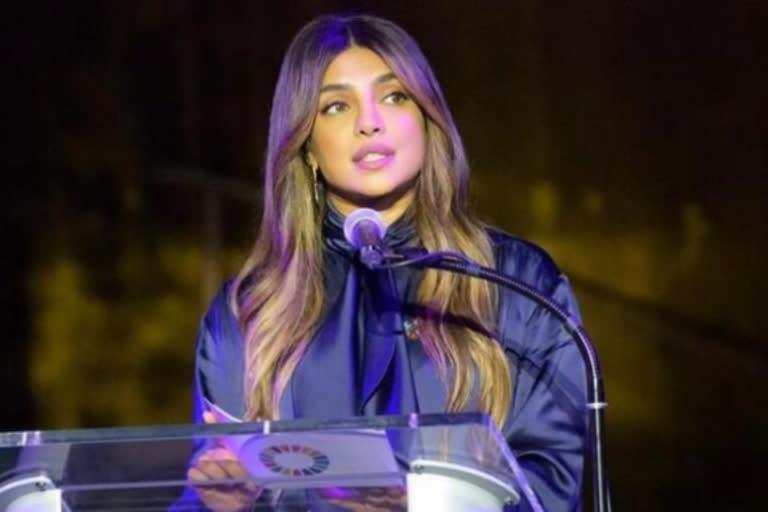Washington: US Vice President Kamala Harris and actor Priyanka Chopra Jonas have reflected on their Indian connections, marriage equality, the war in Ukraine and climate change, as they shared a stage during a leadership forum here. Chopra Jonas, who is now settled in Los Angeles, was invited by the Democratic National Committee's Women's Leadership Forum last Friday to interview Harris for a fireside chat.
The actor kicked off the conversation with their Indian connection. I think we're both daughters of India, in a way, Chopra Jonas told the room full of prominent Democrats invited to the conference from across the country. You're a proud American-born daughter of an Indian mom and a Jamaican father. I am an Indian born of two physicians as parents and a recent immigrant to this country who totally still believes in the wholehearted...American Dream, she said.
Harris, 57, was born at Oakland in California. Her mother Shyamala Gopalan migrated to the US from Tamil Nadu, while her father, Donald J Harris, moved to the US from Jamaica. She is the first woman, the first Black American, and the first South Asian American to be elected US Vice President. The US, Chopra Jonas said, is regarded as a beacon of hope, freedom, and choice for the whole world.
And these tenets are being endlessly assaulted right now, she said. The actor, producer and philanthropist said after working for over 20 years in films, it was only this year that she got paid equal to her male co-stars. Chopra Jonas was most recently seen in Keanu Reeves-led "The Matrix Resurrections". She will next star in The Russo Brothers' series "Citadel" and "It's All Coming Back To Me", opposite Sam Heughan.
Chopra Jonas, 40, also touched upon the issue of marriage equality. She is married to American singer Nick Jonas, with whom she welcomed a baby girl in January 2022. In her remarks, Harris acknowledged that right now they are living in an unsettled world. I've been travelling around the world as Vice President. I've directly talked with 100 world leaders in person or by phone, she said, adding things that we long took for granted are now up for debate and question.
You look, for example, at Russia's unprovoked war in Ukraine. We thought it was pretty well settled--the issue of territorial integrity and sovereignty -- and now that is up for some debate, given what's happening there, Harris said. Harris then quickly turned to domestic issues in the US.
We look in our own country. We thought, surely with the Voting Rights Act and all that it stood for, we assumed and thought the issue of voting rights in America was settled, the US vice president added. Then we had the Shelby v. Holder decision. And then after the 2020 election, when more people voted and more young people voted than ever before, states around our country started systematically and intentionally making it more difficult for people to vote, Harris said.
The Voting Rights Act was passed in 1965 to ensure state and local governments do not pass laws or policies that deny American citizens the equal right to vote based on race. On June 25, 2013, the Supreme Court swept away a key provision of this landmark civil rights law in Shelby County v Holder.
We thought a woman's right--a constitutional right--to make decisions about her own body was settled. No longer, said Harris. The US Supreme Court recently overturned Roe v. Wade, the 1973 decision that had provided a constitutional right to abortion. Agreeing with her, Chopra Jonas said, Absolutely. You're so right. There's so much to navigate right now.
The actor also touched upon the climate change issue as she acknowledged the relief efforts in hurricane-hit Florida. Extreme weather conditions like this are becoming more frequent and more severe. And I wanted to acknowledge the administration for passing the biggest climate legislation in history earlier this year because it is a fact that America's leadership sets an example to other major economies around the world, which are truly dragging their feet when it comes to doing their bit, Chopra Jonas, the UNICEF Goodwill Ambassador, said.
The crisis is real, and the clock is ticking. And the urgency with which we must act is without any question, Harris responded, stressing on adapting to extreme weather conditions. On the point that you made about disparities, you know, back when I was the district attorney of San Francisco, I started one of the first environmental justice units of any District Attorney's office in the country focused on this issue, she said.
As you have described rightly, it is our lowest income communities and our communities of colour that are most impacted by these extreme conditions and impacted by issues that are not of their own making, Harris said. (PTI)



